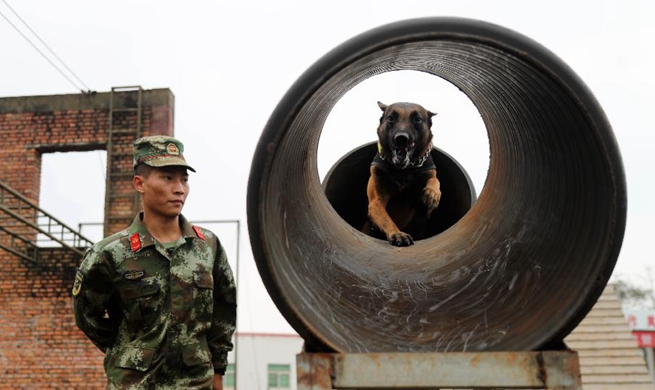LOS ANGELES, Feb. 9 (Xinhua) -- Three-D printable tools may help astronauts analyze how the space environment impacts their health so as to ensure successful long-term missions, the U.S. National Aeronautics and Space Administration (NASA) has said.
Currently, biological samples collected by astronauts cannot be processed on the International Space Station (ISS) and have to be sent back to Earth. It can be months between the time a sample is taken and an analysis is done.
In a news release Thursday, the U.S. space agency said it hopes to develop 3-D printable designs for instruments on the station that can handle liquids like blood samples without spilling in microgravity.
Astronauts collect a variety of samples, including their own saliva and blood, as well as microbes swabbed from the walls of the ISS. These samples have to be mixed with water and then injected into instruments for analysis, NASA said.
With these 3-D printable tools, astronauts could analyze biological samples without sending them back to Earth.
This technology is being developed by the NASA-led Omics in Space project, aiming to study "omics," or fields of microbiology that are important to human health, including research into genomes, microbiomes and proteomes.
Last year, the agency took a big step by sequencing DNA in space for the first time. Astronauts used a tiny, handheld sequencing tool called the MinION, developed by Oxford Nanopore Technologies.
Omics in Space plans to develop an automated DNA/RNA extractor which will prepare samples for a MinION device. A critical part of this extractor is a 3-D printable plastic cartridge needed to extract nucleic acids from the sample.
"What's new is we're developing a one-stop-shop that can extract and process all of these samples," said Camilla Urbaniak, a NASA researcher and co-investigator with Omics in Space.
Scientists are still not sure why astronauts' immune systems tend to be weaker after living on the ISS, which has been revealed in previous omics research. The field of epigenetics, which studies how genes are expressed, including how humans age, may help explain how microgravity and cosmic rays affect the DNA of humans, NASA said.
Astronauts are not the only passengers who travel to the ISS. There are also microbes, carried by humans and cargo alike, which accumulate on board spacecraft.
"We need to put together a 'passenger list' of the microbes that ride along to space," said Nitin Singh, another researcher involved in the project. "Then, astronauts can detect genetic markers revealing whether these microbes are helpful or harmful."
A long-term space mission requires the ability to respond to changes in a crew's environment, said co-investigator Ganesh Mohan, who is in charge of detecting pathogenic microbes.
"You can see whether a possibly harmful microbe is increasing in number in real time. If needed, we could then take actions to counteract those microbes," Mohan said.

















